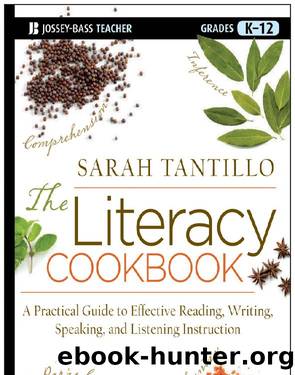The Literacy Cookbook by Sarah Tantillo

Author:Sarah Tantillo
Language: eng
Format: epub
Publisher: Wiley
Published: 2012-11-15T00:00:00+00:00
Doggie Bag
1. What are mentor texts, and why do we need them?
2. How compelling and inspirational are the examples that you share with your students?
3. How might you use mentor texts with your students more effectively?
Writing Workshop 101
In striving for a balanced literacy approach, more and more Kâ8 teachers have begun to incorporate writing workshop into their routines. Although I don't know many high school teachers who use writing workshop in their classes (probably because they tend to have less time than elementary teachers for literacy instruction), there are certainly aspects of writing workshop that high school teachers can and should adopt. I won't describe exhaustively how to run writing workshop because so many others (including those cited here) have already covered this ground. However, it is useful for our purposes to review the basic elements: (1) mini-lesson, (2) individual work with conferences, and (3) sharing sessions. Mentor texts play a key role in the mini-lessons (to model the strategy you're trying to teach) and in writing conferences (when you want to demonstrate specific skills). Let's look at each workshop element more closely .â¦
Mini-lesson
Mini-lessons are âcompact vehiclesâ for teaching the content or skills that you want students to pull from mentor texts. Lucy Calkins suggests an array of categories for mini-lessons: launching the workshop, choosing a topic to write about, conference strategies, classroom procedures, rehearsal and revision strategies, qualities of good writing, and literature.24 When applying a âgenre studyâ approach to writing workshop, Heather Lattimer slices the âlearning categoriesâ pie in half: text structure study (because you need to know the conventions of the genre you're writing in) and writing process study (because writers in different genres âadapt the standard âgather ideas, outline, draft, edit, revise, publishâ process to fit their genreâ).25 No matter which approach you take, you can plan ahead, but you should also expect to change your plans to meet students' needsâor, as my high school Latin teacher used to say with a wide grin, âLet âflexibilityâ ever be our watchword!â Great teachers set high standards, observe students with care and vigilance, and adjust their plans as needed to ensure that students meet (or exceed) their standards.
Most mini-lessons follow this standard format:26
Connection. Make a connection to work that students have been doing already. Name the teaching point.
Teaching. Name the context that might lead a writer to use today's strategy. Use a mentor text to give an example of a writer using that strategy. Demonstrate how to use the strategy. Include bits of advice as you go.
Active engagement. Prepare children to use the strategy you've just taught by helping them to imagine themselves in the situation that calls for that strategy. Then give them a brief chance to try the strategy, usually involving a Think-Pair-Share approach. Keep in mind that this is supposed to be a mini-lesson, so you want to be efficient. Calkins and Martinelli recommend soliciting or reporting on two examples, ideally ones you've overheard and vetted.27
Link. Link the mini-lesson to students' independent writing, often by reminding them of what they've learned.
Download
This site does not store any files on its server. We only index and link to content provided by other sites. Please contact the content providers to delete copyright contents if any and email us, we'll remove relevant links or contents immediately.
The Art of Coaching Workbook by Elena Aguilar(51087)
Trainspotting by Irvine Welsh(21579)
Twilight of the Idols With the Antichrist and Ecce Homo by Friedrich Nietzsche(18579)
Fangirl by Rainbow Rowell(9186)
Periodization Training for Sports by Tudor Bompa(8222)
Change Your Questions, Change Your Life by Marilee Adams(7693)
This Is How You Lose Her by Junot Diaz(6842)
Asking the Right Questions: A Guide to Critical Thinking by M. Neil Browne & Stuart M. Keeley(5717)
Grit by Angela Duckworth(5559)
Red Sparrow by Jason Matthews(5432)
Paper Towns by Green John(5143)
Room 212 by Kate Stewart(5078)
Ken Follett - World without end by Ken Follett(4688)
Housekeeping by Marilynne Robinson(4404)
The Sports Rules Book by Human Kinetics(4349)
Double Down (Diary of a Wimpy Kid Book 11) by Jeff Kinney(4245)
Papillon (English) by Henri Charrière(4230)
The Motorcycle Diaries by Ernesto Che Guevara(4057)
Exercise Technique Manual for Resistance Training by National Strength & Conditioning Association(4030)
